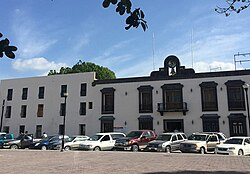San Fernando, Tamaulipas
San Fernando
Municipio de San Fernando | |
|---|---|
 Municipal Presidency of San Fernando, Tamaulipas | |
| Coordinates: 24°50′N 98°09′W / 24.833°N 98.150°W | |
| Country | Mexico |
| State | Tamaulipas |
| Founded | March 19, 1749 |
| Government | |
| • Presidente Municipal | José Rios Silva |
| Area | |
• Total | 6,091.36 km2 (2,351.89 sq mi) |
| Elevation | 40 m (130 ft) |
| Population (2010 census) | |
• Total | 57,220 |
| Time zone | UTC-6 (CST) |
| Codigo Postal | 87600 |
| Area code | 841 |
| Website | http://www.sanfernando.gob.mx/ |
San Fernando is a city located in the Mexican state of Tamaulipas; it serves as the seat of the surrounding municipality of the same name. It is about 85 miles (137 km) away from Brownsville, Texas, United States.[1] The municipality has a population of 57,220, while the city itself has a population of 29,665.
History
[edit]Massacres
[edit]San Fernando, Tamaulipas, is notorious for experiencing two of the largest recorded massacres of the Mexican drug war. The first massacre, known as the 2010 San Fernando massacre, occurred following a gunfight in Tamaulipas between drug cartel gunmen and Mexican authorities, in which three gunmen and a marine were killed.[2] After the authorities patrolled the nearby area, they discovered 72 bodies in a remote ranch in Tamaulipas.[3] The bodies were found in a room, some of which were piled up on top of each other.[4] It was "the biggest single discovery of its kind" in the ongoing drug war.[2] The 58 men and 14 women were believed to be undocumented migrants from South and Central America trying to cross the border to the United States.[4] A surviving migrant claims that the migrants were kidnapped by the Los Zetas cartel and killed for refusing to do work for them.[5] Twenty one rifles, 101 ammunition clips, four bullet-proof vests, camouflage uniforms and four vehicles were seized by officials.[6]
The second massacre, the 2011 San Fernando massacre, was discovered after Mexican authorities exhumed more than 40 mass graves, with a final body count of 193 corpses.[7]
The massacres and the Mexican government's response are the subject of San Fernando: Última Parada, a book written by journalist Marcela Turati.[8]
External links
[edit]- Gobierno Municipal de San Fernando Official website (in Spanish)
References
[edit]- ^ Schiller, Dane. "Zeta captives have to fight or die." Houston Chronicle at the San Antonio Express-News. Updated Wednesday June 15, 2011. Retrieved on January 4, 2012.
- ^ a b Robin Emmott; Patrick Rucker; Miguel Angel Gutierrez (25 August 2010). "Drug hitmen dump 72 bodies at Mexican ranch". Reuters. Retrieved 26 August 2010.
- ^ "72 bodies found on ranch in Mexico". RTÉ News. 25 August 2010. Retrieved 26 August 2010.
- ^ a b "Murdered bodies found in Mexico 'were migrants'". BBC News. 25 August 2010. Retrieved 26 August 2010.
- ^ William Booth (25 August 2010). "Survivor: Drug gang massacred 72 migrants in northern Mexico". The Washington Post. Retrieved 26 August 2010.
- ^ "72 bodies found in Mexico ranch". Hindustan Times. 26 August 2010. Archived from the original on 28 August 2010. Retrieved 26 August 2010.
- ^ "Hallan 7 nuevas narcofosas en San Fernando Tamaulipas suman 193 cadáveres". Milenio TV. Jun 7, 2011.
- ^ Turati, Marcela (2023). San Fernando:última parada: viaje al crimen autorizado en Tamaulipas. México: Penguin Random House Grupo Editorial. ISBN 978-607-38-1205-4.



